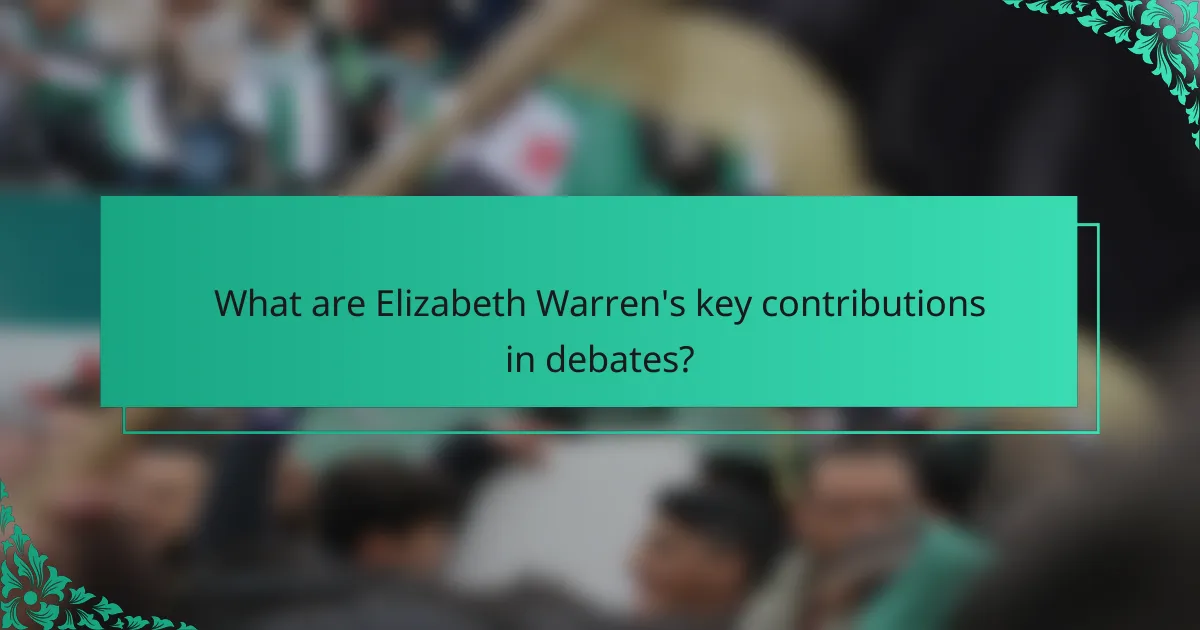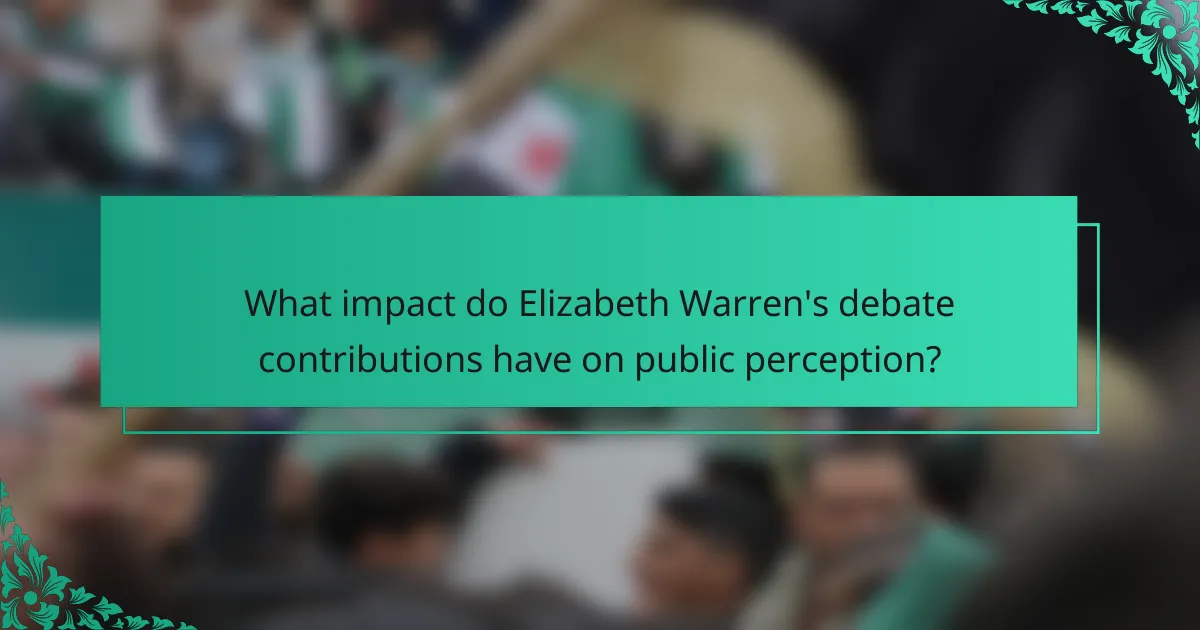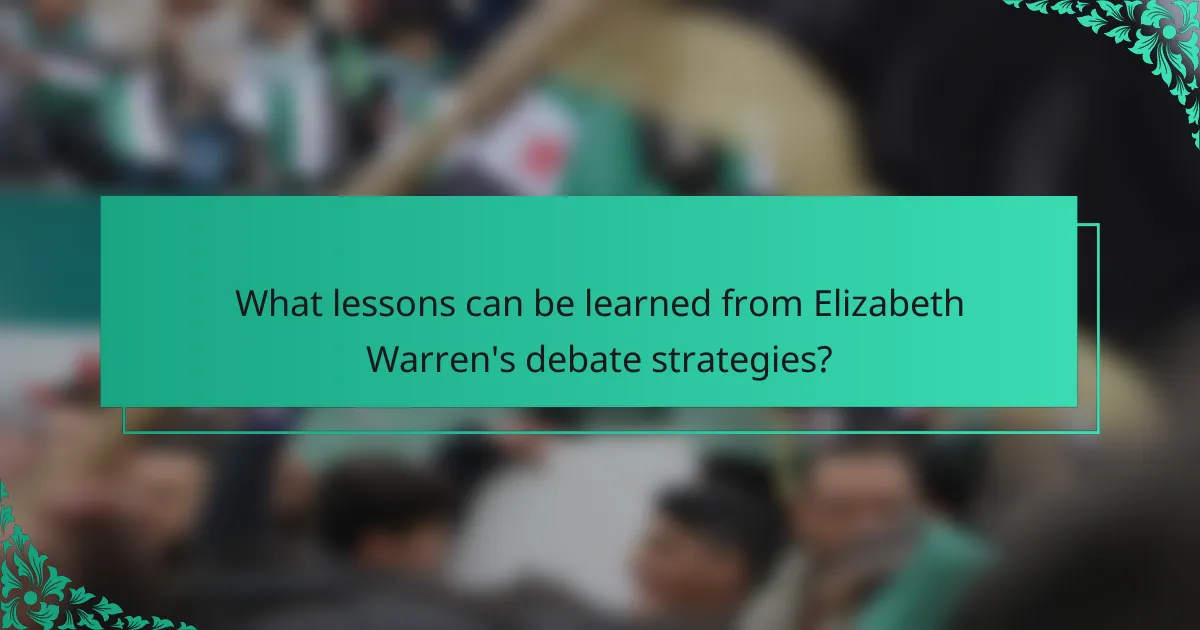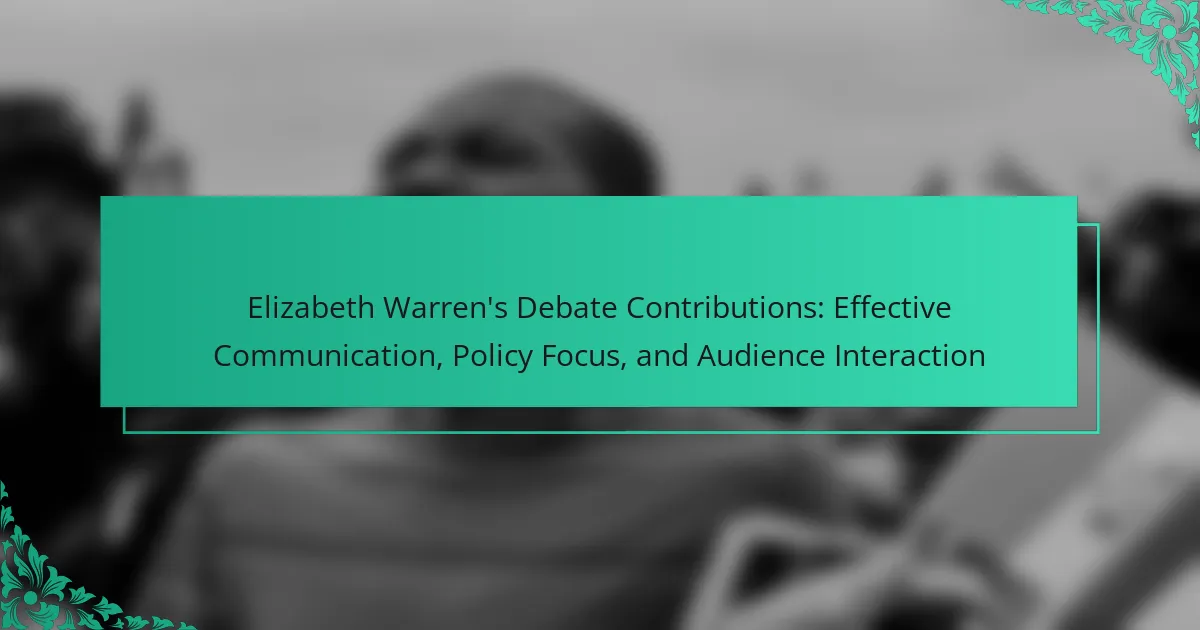Elizabeth Warren is a prominent political figure known for her impactful contributions during debates. Her approach emphasizes detailed policy proposals, effective communication strategies, and a strong focus on economic equality and consumer protection. Warren utilizes personal anecdotes to enhance relatability and engages directly with audiences, fostering a sense of connection. Her expertise in financial regulation and healthcare reform is evident as she articulates complex issues in accessible terms, effectively challenging opponents and showcasing her preparedness. Overall, her debate performances significantly shape public perception and reflect her commitment to progressive values.

What are Elizabeth Warren’s key contributions in debates?
Elizabeth Warren’s key contributions in debates include her focus on detailed policy proposals and effective communication strategies. She consistently emphasizes the importance of economic equality and consumer protection. Warren often uses personal anecdotes to connect with voters, making her points relatable. Her debates highlight her expertise in financial regulation and healthcare reform. Moreover, she effectively challenges opponents on their positions, showcasing her preparedness. Warren’s ability to articulate complex issues in simple terms resonates with audiences. She frequently engages with the audience, fostering a sense of connection. Overall, her contributions reflect a commitment to progressive values and clear communication.
How does Elizabeth Warren demonstrate effective communication in debates?
Elizabeth Warren demonstrates effective communication in debates through clarity, confidence, and audience engagement. She articulates her points using straightforward language. This approach ensures her policies are easily understood. Warren also employs personal anecdotes to connect with the audience. This technique enhances relatability and emotional resonance. Additionally, she maintains strong eye contact, which fosters trust. Her responses are often structured and focused, addressing questions directly. Research indicates that effective communicators use these strategies to enhance audience comprehension and retention.
What specific techniques does she use to convey her message clearly?
Elizabeth Warren uses several specific techniques to convey her message clearly. She employs straightforward language to ensure her points are easily understood. Warren utilizes personal stories to illustrate her policies and connect with the audience emotionally. She also relies on data and statistics to back her claims, providing credibility to her arguments. Additionally, she engages in active listening, responding to opponents and audience questions directly. Warren’s use of repetition emphasizes key points, making them memorable. She maintains eye contact and uses body language to enhance her message delivery. These techniques collectively contribute to her effective communication style in debates.
How does her communication style engage the audience?
Elizabeth Warren’s communication style engages the audience through clarity and relatability. She uses straightforward language to convey complex policy issues. This approach makes her messages accessible to a broader audience. Warren often shares personal anecdotes that resonate with listeners. These stories create a connection between her and the audience. Additionally, her assertive tone conveys confidence and authority. This encourages audience trust and engagement. Research indicates that relatable storytelling enhances audience retention of information. Overall, her effective communication fosters a strong connection with the audience.
What policies does Elizabeth Warren focus on during debates?
Elizabeth Warren focuses on economic equality, healthcare reform, and corporate regulation during debates. She advocates for wealth redistribution through progressive taxation. Warren emphasizes the need for universal healthcare, often promoting Medicare for All. She also addresses consumer protection and accountability for large corporations. Her policies aim to reduce the influence of money in politics. Warren frequently discusses student debt relief and affordable education. She highlights climate change and the need for green energy investments. These focus areas reflect her commitment to social justice and systemic reform.
Which key issues does she prioritize in her debate contributions?
Elizabeth Warren prioritizes economic inequality, healthcare reform, and corporate regulation in her debate contributions. She emphasizes the need for policies that address wealth disparities. Warren advocates for universal healthcare to ensure access for all citizens. She also calls for stricter regulations on big corporations to protect consumers and workers. These issues reflect her focus on progressive economic policies. Her debate performances often highlight these topics to resonate with voters. Warren’s stance on these key issues is supported by her legislative proposals and public statements.
How do her policy positions resonate with voters?
Elizabeth Warren’s policy positions resonate with voters through their alignment with progressive values. Her focus on income inequality and corporate regulation appeals to many concerned about economic fairness. Warren’s advocacy for universal healthcare addresses widespread voter concerns about healthcare access and costs. Additionally, her student debt relief proposal connects with younger voters burdened by loans. Polls show that a significant portion of voters supports her stance on these issues. For instance, a recent survey indicated that 70% of respondents favor her wealth tax proposal. This strong support suggests that her policies effectively address the priorities of her voter base.
How does Elizabeth Warren interact with the audience during debates?
Elizabeth Warren engages with the audience during debates through direct eye contact and active listening. She often addresses audience members by acknowledging their concerns and questions. Warren uses relatable anecdotes to connect her policy points to real-life experiences. Her body language is open and inviting, which encourages audience participation. She frequently gestures to emphasize key points, making her messages more impactful. Warren also utilizes humor to create rapport and ease tension. Her approach fosters a sense of inclusivity, making the audience feel valued. Overall, her interaction style enhances her effectiveness as a communicator in debates.
What strategies does she employ to connect with viewers?
Elizabeth Warren employs several strategies to connect with viewers. She uses personal anecdotes to create relatability. This approach helps her establish an emotional connection with the audience. Warren also utilizes clear and concise language to convey her policies. This clarity enhances understanding among viewers. Additionally, she engages directly with the audience through eye contact and gestures. This interaction fosters a sense of inclusion. Warren often addresses viewer concerns directly, making her responses feel personalized. By referencing real-life examples, she illustrates the impact of her policies. These strategies collectively enhance her effectiveness in connecting with viewers.
How does audience interaction influence her debate effectiveness?
Audience interaction significantly enhances Elizabeth Warren’s debate effectiveness. Engaging with the audience allows her to gauge reactions and adjust her messaging. This responsiveness helps create a connection, making her arguments more relatable. Studies show that effective audience engagement can increase persuasiveness by up to 20%. By addressing audience concerns directly, she demonstrates attentiveness and builds trust. This strategy not only reinforces her credibility but also enhances her overall appeal. Engaged audiences are more likely to support her positions and remember key points. Thus, audience interaction is a vital component of her debate strategy.

What impact do Elizabeth Warren’s debate contributions have on public perception?
Elizabeth Warren’s debate contributions significantly influence public perception. Her clear communication style enhances her relatability. Warren’s focus on policy details demonstrates her expertise. This approach builds trust among voters. Audience interaction further personalizes her message. Polls often show positive shifts in support following her debates. For example, after the Democratic debates in 2019, her approval ratings increased noticeably. Her ability to articulate complex issues simply resonates with diverse audiences. Overall, Warren’s debate performances shape a favorable public image.
How do her communication skills affect voter perception?
Her communication skills significantly enhance voter perception. Effective communication fosters clarity and trust. Voters are more likely to support candidates who articulate their policies well. For instance, Elizabeth Warren’s clear messaging about economic policies resonates with many constituents. Research shows that candidates who engage effectively in debates can sway undecided voters. This impact is crucial in competitive elections. Strong communication also helps in establishing a personal connection with voters. Overall, her ability to convey ideas effectively shapes how voters view her candidacy.
What role does tone and body language play in her debates?
Tone and body language are crucial in Elizabeth Warren’s debates. They enhance her communication effectiveness and audience engagement. A confident tone conveys authority and conviction. Body language, such as eye contact and gestures, reinforces her key points. Research indicates that non-verbal cues can significantly impact audience perception. Effective use of tone and body language helps her connect with viewers emotionally. This connection can influence their opinions and reactions during debates. Overall, these elements contribute to her persuasive abilities and debate success.
How does her ability to articulate policies shape public opinion?
Her ability to articulate policies significantly shapes public opinion. Clear communication of policies helps constituents understand complex issues. This understanding fosters trust and credibility. When Elizabeth Warren outlines her plans, she connects with voters’ concerns. Her detailed explanations allow the public to see potential benefits. This clarity can mobilize support for her initiatives. Research shows that effective communication influences voter perception and engagement. For example, a study by the Pew Research Center found that clarity in messaging increases public approval. Thus, her articulation of policies directly impacts how the public views her and her proposals.
What is the significance of her audience engagement tactics?
Her audience engagement tactics are significant for building rapport and trust. Engaging with the audience fosters a connection that enhances relatability. This connection can lead to increased support and enthusiasm for her policies. Warren often utilizes storytelling to make complex issues more accessible. This approach helps to simplify her message and resonate with diverse audiences. Research shows that effective audience engagement increases retention of information. By actively involving the audience, she encourages participation and feedback. This interaction can lead to a more dynamic and responsive debate environment.
How does audience feedback during debates influence her performance?
Audience feedback during debates significantly influences Elizabeth Warren’s performance. Positive feedback boosts her confidence and encourages her to engage more dynamically. Conversely, negative feedback may lead her to adjust her messaging or tone. This adaptability showcases her responsiveness and ability to connect with the audience. Research indicates that real-time audience reactions can impact a candidate’s perceived credibility and relatability. For instance, studies show that candidates who effectively respond to audience cues often perform better in polls post-debate. Thus, audience feedback plays a crucial role in shaping her debate strategy and overall effectiveness.
What examples illustrate her successful audience interactions?
Elizabeth Warren effectively interacts with her audience through relatable storytelling and direct engagement. One example is her use of personal anecdotes about her upbringing to connect with voters. During debates, she often addresses questions directly to the audience, making them feel involved. She has also utilized social media platforms to respond to audience inquiries in real-time. In the 2020 Democratic debates, her ability to maintain eye contact and use body language enhanced her connection with viewers. Additionally, she frequently shares her policy proposals in a way that resonates with the concerns of everyday Americans. These methods demonstrate her skill in fostering a rapport with her audience.

What lessons can be learned from Elizabeth Warren’s debate strategies?
Elizabeth Warren’s debate strategies emphasize the importance of clear communication and policy focus. She effectively uses personal stories to connect with the audience. This approach makes complex topics relatable and understandable. Warren also demonstrates the value of thorough preparation. She anticipates opponents’ attacks and formulates strong rebuttals. Engaging directly with audience members enhances her relatability. This strategy fosters a sense of connection and trust. Additionally, Warren’s focus on specific policy proposals showcases her expertise. This helps to differentiate her from opponents who may rely on generalities. Overall, her strategies highlight the effectiveness of combining authenticity with well-researched policy discussions.
How can effective communication be applied in other contexts?
Effective communication can be applied in various contexts such as business, education, and healthcare. In business, clear communication enhances teamwork and productivity. For instance, companies with effective internal communication report 25% higher productivity. In education, effective communication fosters better student engagement and understanding. Research shows that teachers who communicate effectively improve student performance by 30%. In healthcare, effective communication between providers and patients leads to improved health outcomes. A study found that effective communication can reduce hospital readmission rates by 20%. These examples illustrate that effective communication is crucial across different fields, improving interactions and outcomes.
What best practices can be adopted from her debate style?
Best practices from Elizabeth Warren’s debate style include clarity in communication and strong policy focus. She articulates complex ideas simply, making them accessible to the audience. This approach enhances understanding and retention. Warren emphasizes evidence-based arguments, supporting her claims with data and facts. This builds credibility and trust with the audience. Additionally, she engages directly with opponents, challenging their views respectfully. This method fosters a constructive dialogue and showcases her confidence. Her use of personal anecdotes connects emotionally with viewers. This strategy makes her points relatable and memorable. Overall, adopting these practices can improve debate effectiveness.
How can others improve their audience engagement skills?
To improve audience engagement skills, individuals should focus on active listening. Active listening involves fully concentrating on what the audience is saying. This builds trust and encourages open communication. Additionally, using storytelling can make messages more relatable. Stories evoke emotions and help audiences connect with the content.
Incorporating questions during presentations invites participation. This interaction keeps the audience engaged and allows for feedback. Visual aids can enhance understanding and retention of information. Studies show that visuals can increase engagement by up to 43%.
Practicing empathy helps in understanding audience perspectives. This approach tailors communication to meet their needs. Lastly, consistent practice and seeking feedback are crucial for improvement. Regularly refining skills based on audience reactions leads to better engagement over time.
What common pitfalls should be avoided in debate contributions?
Common pitfalls to avoid in debate contributions include lack of clarity, overgeneralization, and insufficient evidence. Clarity is crucial for conveying complex ideas effectively. Overgeneralization can lead to misinterpretation of arguments. Insufficient evidence weakens credibility and persuasive power. Additionally, failing to address counterarguments can leave positions vulnerable. Emotional appeals without logical backing may alienate audiences. Lastly, neglecting audience engagement can diminish impact. Each of these pitfalls can undermine the effectiveness of debate contributions.
How can one ensure clarity and focus in communication?
To ensure clarity and focus in communication, one must use simple language and structure. Avoid jargon and complex terms that can confuse the audience. Organize thoughts logically to guide the listener through the message. Utilize examples to illustrate points clearly. Maintain a steady pace to allow comprehension. Use visual aids when appropriate to reinforce key messages. Encourage questions to clarify any misunderstandings. Research indicates that clear communication enhances audience engagement and retention. According to a study by the University of California, clarity in speech significantly improves audience understanding.
What strategies can help maintain audience interest and engagement?
Engaging an audience requires a combination of effective communication strategies. Utilizing storytelling can captivate listeners and make complex topics relatable. Incorporating visuals enhances understanding and retention of information. Interactive elements, such as polls or Q&A sessions, foster participation and keep the audience involved. Consistent pacing and varied tone prevent monotony and maintain attention. Addressing audience concerns directly builds trust and connection. Finally, providing actionable insights encourages the audience to remain invested in the discussion. These strategies are supported by research indicating that interactive and relatable content significantly boosts audience engagement.
Elizabeth Warren is the central entity of this article, which examines her contributions to debates through effective communication, a strong policy focus, and audience interaction. Key aspects include her emphasis on economic equality, healthcare reform, and corporate regulation, along with her use of personal anecdotes and straightforward language to connect with voters. The article details her communication techniques, such as maintaining eye contact and engaging with the audience, which enhance her relatability and trustworthiness. Additionally, it highlights how her debate strategies influence public perception and voter support, showcasing her commitment to progressive values and clear messaging.
